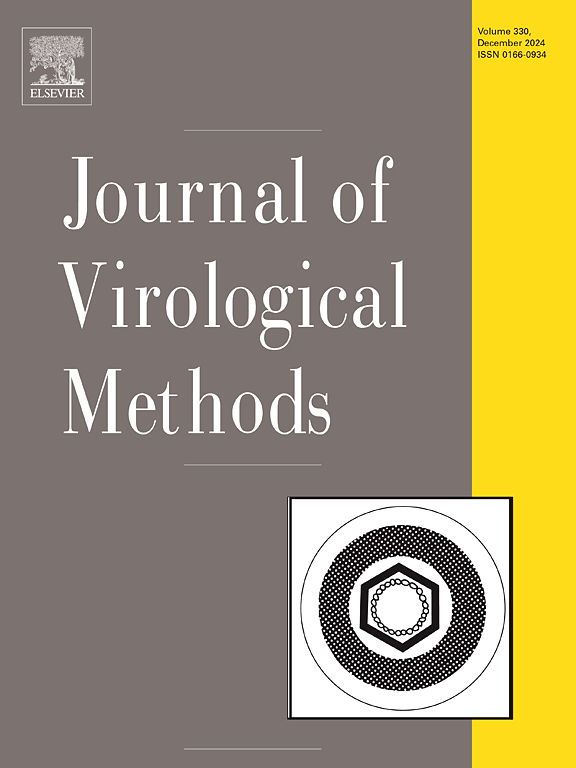A novel restriction fragment length polymorphism (RFLP) -based method for rapid genotyping of bovine coronaviruses
IF 1.6
4区 医学
Q3 BIOCHEMICAL RESEARCH METHODS
引用次数: 0
Abstract
Outbreaks of diarrhea and respiratory symptoms caused by bovine coronavirus (BCoV) have been reported worldwide, leading to significant economic losses. It is important to genetically analyze the spike (S) gene of this virus as it is closely linked to its antigenicity and virulence, in order to quickly understand the molecular characteristics of circulating BCoVs. A previous study showed that BCoVs can be easily genotyped using reverse transcription (RT)-polymerase chain reaction (PCR)-restriction fragment length polymorphism (RFLP) analysis using AvaII and EcoO65I enzymes targeted on the polymorphic region in the S1 subunit of the S gene. However, we found that a total number of 19 BCoV strains, including three BCoV strains isolated in this study and 16 Japanese BCoV strains available in GenBank, could not be genotyped by the original RT-PCR/RFLP analysis in silico. This study aimed to modify the original RT-PCR/RFLP assay by introducing additional restriction enzymes (AvaII, EcoO65I, AfaI, and Bsp1286I) to more accurately genotype recent Japanese BCoV strains without sequencing. As a result, the newly designed RT-PCR/RFLP analysis we established led to 98.3 % (291 of 296 BCoV strains used in this study) highly improved the accuracy of genotyping of BCoV. Therefore, this modified RT-PCR/RFLP method is useful for rapidly monitoring BCoVs, as it is a simple, easy, and inexpensive analysis that does not require sequencing.
基于限制性内切片段长度多态性(RFLP)的牛冠状病毒快速基因分型方法
牛冠状病毒(BCoV)引起的腹泻和呼吸道症状在世界范围内暴发,导致重大经济损失。由于刺突(S)基因与其抗原性和毒力密切相关,因此对该病毒的刺突(S)基因进行遗传分析对于快速了解循环bcov的分子特征非常重要。先前的研究表明,利用针对S基因S1亚基多态性区域的AvaII和EcoO65I酶,利用逆转录(RT)-聚合酶链反应(PCR)-限制性片段长度多态性(RFLP)分析可以很容易地对bcov进行基因分型。然而,我们发现19株BCoV(包括本研究分离的3株BCoV和GenBank中现有的16株日本BCoV)无法通过原始的RT-PCR/RFLP分析进行基因分型。本研究旨在通过引入额外的限制性内切酶(AvaII, EcoO65I, AfaI和Bsp1286I)来修改原始的RT-PCR/RFLP方法,从而更准确地对近期日本BCoV菌株进行基因分型,而无需测序。因此,我们所建立的RT-PCR/RFLP分析方法的准确率为98.3%(本研究使用的296株BCoV中有291株),大大提高了BCoV基因分型的准确性。因此,这种改进的RT-PCR/RFLP方法可用于快速监测bcov,因为它是一种简单,容易且不需要测序的廉价分析方法。
本文章由计算机程序翻译,如有差异,请以英文原文为准。
求助全文
约1分钟内获得全文
求助全文
来源期刊
CiteScore
5.80
自引率
0.00%
发文量
209
审稿时长
41 days
期刊介绍:
The Journal of Virological Methods focuses on original, high quality research papers that describe novel and comprehensively tested methods which enhance human, animal, plant, bacterial or environmental virology and prions research and discovery.
The methods may include, but not limited to, the study of:
Viral components and morphology-
Virus isolation, propagation and development of viral vectors-
Viral pathogenesis, oncogenesis, vaccines and antivirals-
Virus replication, host-pathogen interactions and responses-
Virus transmission, prevention, control and treatment-
Viral metagenomics and virome-
Virus ecology, adaption and evolution-
Applied virology such as nanotechnology-
Viral diagnosis with novelty and comprehensive evaluation.
We seek articles, systematic reviews, meta-analyses and laboratory protocols that include comprehensive technical details with statistical confirmations that provide validations against current best practice, international standards or quality assurance programs and which advance knowledge in virology leading to improved medical, veterinary or agricultural practices and management.

 求助内容:
求助内容: 应助结果提醒方式:
应助结果提醒方式:


